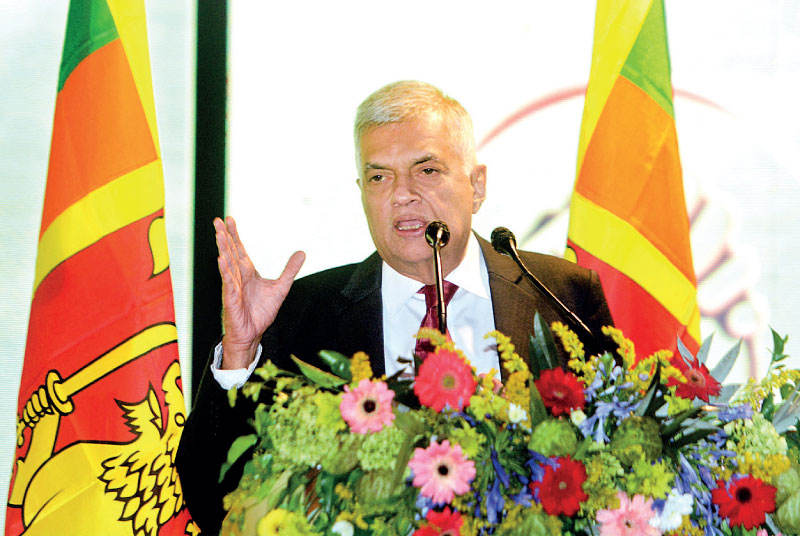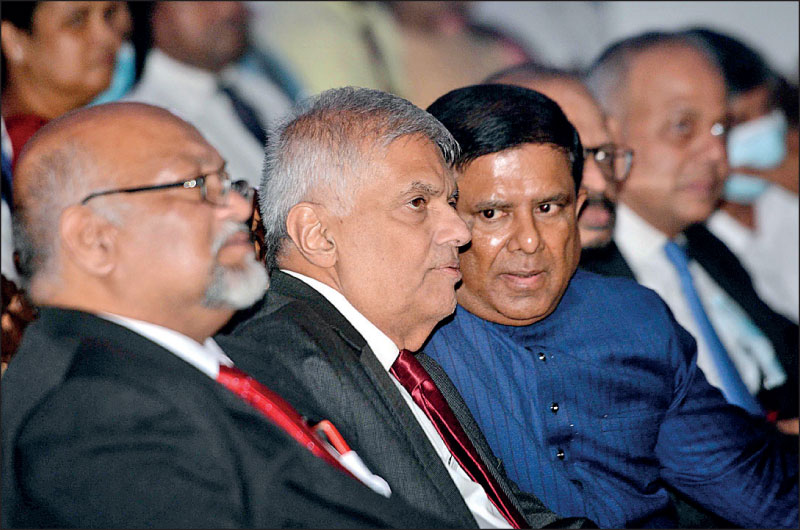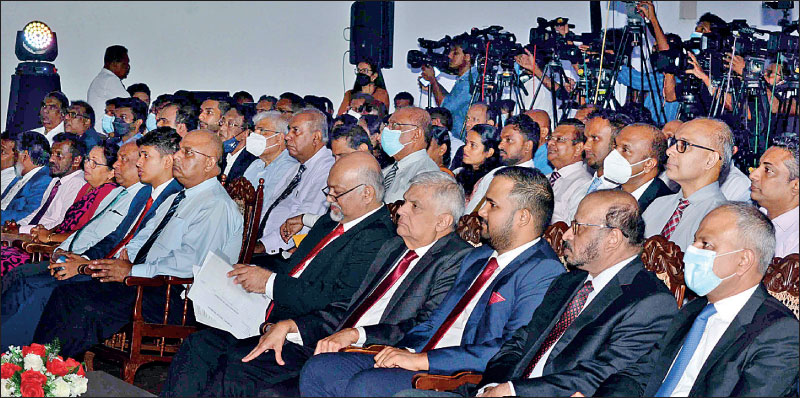Monday Feb 23, 2026
Monday Feb 23, 2026
Friday, 10 June 2022 00:00 - - {{hitsCtrl.values.hits}}

Prime Minister Ranil Wickremesinghe
|
Chairman and Members of the Association of Constructive Professionals and Friends,
I’ve been asked to address you on Sri Lanka’s twin crisis. One has already started, the economic crisis in Sri Lanka. I need not go back to the past as to how we deprived ourselves of our foreign exchange, how we decided that we’d go on to do it alone and the facts were concealed not only from the public but from Parliament, and from the members of the then government. And stemming from it is also a political crisis, the question of loss of confidence in a political system that allowed the country to go down to this level.
So this is what we’re grappling with. There’s a second crisis. The second crisis is the global impact of the Ukraine crisis. We’re only seeing the beginning of it, the increase in fuel (price). It will get much worse as it goes along. As it goes along you’d probably find that there’ll be a shortage of food.
The food shortage will go global till 2024. After all Russia and Ukraine, one is the largest producer of grain, the other is the fifth largest. You cannot import Russian grain, and in Ukraine whatever is left cannot be sent off. Their ports are closed by the Russians, and their rail track gauge is different from that of Poland. So each carriage has to be lifted and put onto the Polish track. You can’t send food out there. And many of the fields of their agricultural area are destroyed. If the war stops even tomorrow, it will take Ukraine at least three years to get its cultivation back on track.
Then the rising price of fuel, the rising price of corn, again the shortage of fertiliser. So it hits the whole world. There’s a shortage of fertiliser in California, there’s a shortage of fertiliser in Brazil. How do you meet it? And there’s going to be a shortage of food. Already countries are banning the export of food. That’s the second one you have, that you’re facing.
|
So what is going to happen? No, no we’re not going to add the Ukraine crisis to the Sri Lankan crisis. That is not the impact. The impact is going to be the Sri Lankan crisis multiplied by the Ukraine crisis. So this is just the beginning. And just because of the shortage of dollars and rupees we have already shaken the political system.
I came today from a meeting of the political party leaders in Parliament, and they are awaiting to reach a consensus on how the 21st or the new amendment should be brought in as an amendment which will avoid any provision that will require a referendum. But will that do? As this crisis gets worse there are going to be many countries that are going to be affected by the Ukraine crisis. Some say 40 some say 70. But we’re unique. Until the war came their economic means were normal. Not in our case; we have already started suffering. So where do we go from here? We didn’t go early enough to the IMF.
Take the case of Zambia, they went early but the case got delayed because the Chinese and the others could not agree; now it has come to a staff agreement, it has to go to the IMF Board to be finalised. But in the meantime of the Ukrainian crisis the price of copper has gone up, so they can manage until they get the required assistance from the IMF.
Ours is different; we’re losing our sources of foreign exchange. So this is what we are faced with. And as I said, this is only the beginning. At the moment, there are no queues for petrol, what you don’t understand is that I have to do the job not only of the Prime Minister, but also of a firefighter. Every morning from where can you find $ 20 million, $ 30 million dollars, $ 40 million to pay for a ship? If we miss one, then there’ll be a shortage at the end. You can’t carry on a government like this. The problem we face now is so bad, that what’ll happen when the Ukraine crisis comes on is another story.
We have run down our economy, we have state enterprises owing trillions and trillions of rupees to the banks, we have enterprises that are losing, we have projects which will not benefit Sri Lanka. There’s no Priority List. Even till recently different agencies were actually using the different credit lines to order what they wanted, there was no priority. If someone said ‘I want fertiliser’ that was the effort, if someone said “I want petrol’ that was there. We had to establish a Priority Order and sort of centralise the access to the foreign credit lines.
So this is just a start of what we have to do. The worst is still to come. As you know there will be no food, as in our food supplies will be enough until about September-October because we didn’t have enough fertiliser either for ‘Maha’ or for ‘Yala’. Now we’re trying to get fertiliser for the next ‘Maha’ season. If we do, then we will certainly be self-sufficient by February next year. What do you do in between? As the economy fails, more and more jobs are being lost. More and more enterprises, big and small are collapsing. This is what we’re going for. A time will come when people will not eat three meals a day. They may eat two meals; that situation may come for some of our people.
We have to avoid hunger. Is there an end to it? Well, we’re talking with other nations, our friendly nations, to get help. There is light at the end of the tunnel, but we need to ensure that there are no earth slips while we go through the tunnel. That’s the problem. We cannot get through this year by ourselves. We need a few billion dollars to come from outside. Otherwise this country cannot survive. We need to reach out again to the people we rejected. The Japanese have been our friends from 1952 to date who are hurt by what happened. Which country rejects 3 billion dollars’ worth of aid, without a thank you, without even having a negotiation? Just said we don’t want it. How do you build back confidence with those people?
We’re lucky that India has come forward to help us, at the hour of our need. Other countries are chipping in. China has come with assistance, but someone in the government went and negotiated a loan, a swap, which we cannot use.
We have to look at Europe and the West. China also has a problem with its COVID and downturn in the economy, the West is also having a problem, one is inflation that is raging there, the price of fuel has gone up, and secondly they’re putting their money into Ukraine. Over $ 100 billion have gone into Ukraine. A hundred billion less for the rest of the world. So it is essential that we do get help from our friends and make up with them. If the fault is ours we should apologise. If the fault is theirs, tell them it’s your fault. You can’t have friendly relations with countries and then throw them aside. Some official decides we don’t want it, however high he is, and that’s the end of it. What is the end result? We’re starving.
Whenever we had a problem earlier, it was Japan who bailed us out. I remember during the Kuwait war, when all our people had to return from the Gulf, President Premadasa sent me to Japan to meet Prime Minister Kaifu. He took the letter, he put it on a side and said ‘Yes, I will ask my people to study it’ and before I went I was told ‘600 million dollars for you’. 600 million dollars in the 1990s is a big deal. That is how we worked.
Today it’s different. I have to spend time rebuilding trust with these people, talking with them to increase assistance. Some of the countries have promised the government earlier with assistance, but that is not enough. We have to reach out to the ones like Japan. India has started the process and China is coming but Japan is needed and the rest is needed.
Then we have to sit down, we have to talk with the IMF, push through an agreement soon, there are a large number of countries ready to go up to the Director Board, and at the same time we have to decide on our debt. What are we going to do? How is the consortium going to work? Because the Chinese criteria is different from that of others. So how do you ensure that all of them share the burden equally, though the assistance may be different? This is another issue that we’re facing. We have to get all of them together, who’s going to summon the consortium? Where are they going to meet? And how are they going to agree? So we have to speak to all the members to see how we can help to iron out the differences.
This is the situation where to go forward, we need their help. We have to get their help. Then only we can start working out within the country. Otherwise we will find that gradually the economy is slowly coming to a halt, in different sectors. Already the construction industry is coming to a halt, tourism has fallen by the wayside, two of our major sectors of the economy. Into this we have to ensure that people at least, are fed, food is available. So we have to start a food security program of cultivating our own food, and that’ll have to go on till 2024. Because 2023 also may be a bad year globally. So till 2024 we have to go on. And I hope that all of you and others will join in this effort.
Within this we’re working on an Economic Stabilisation Program. I’ve appointed a Council, and they will be meeting, stabilising the economy, making the money available and ensuring that the real economy starts functioning again. But that is not enough. The next is how do we recover? What are we going to do? Then we have to find bridging finance till the IMF and others come through. How are we going to recover? For that we must decide the principles. Remember at the end of this program of stabilising, our debt would have gone up higher. The 50 billion would have gone up more. Then every year, we’ll have to keep borrowing. So how are we going to repay it? If we don’t repay it within 3-4 years we come back to the same position. That we have to remember.
We have to have a new economy. The old one will not answer. We have to earn more money, more dollars, then we must have an export oriented economy. For the export oriented economy to function we must be highly competitive. We have to restructure the economy. We have to make it outward looking, your business must be able to go out, to create new markets, new businesses. Services, may be logistics and expansion of IT and many other sectors. And we have now come to the next problem. Our professionals are leaving the country. How are we going to fill it?
So these are now what we are focusing on, and I think all of you should also focus on how do we recover? How do we start earning money, not merely arriving at a surplus on the primary budget, but a surplus over all? And a balance of trade surplus. These are difficult things which we have not achieved before, but I am confident that if we work together, go in the correct position, we will achieve it.
We have to ensure that this is only a short period that we go through this year and part of next year. And so we can start recovering by 2025. We can get back to having a break even budget and a primary surplus. Then you bring in a new economy, where all of us have to earn, where we have to be able to earn foreign exchange, and open up the country. The old system has failed. We tried to look inwards, we didn’t encourage investments that came in. I find a large number of applications for investments stuck somewhere. Departments are not moving. So we have to think anew, bring a new structure, and to do all that, a new mindset. What can you do? Kindly create that new mindset. That is a start. No one knows of the limit.
|
Some of the countries ask ‘Alright, before we help you have you helped yourself? What have you done to raise this money? Now I have to answer that. Without that we can’t go. People can get on to the street and demonstrate we don’t want this, we are not doing that. But at the end of the day if we don’t help ourselves no one else will help us.
So we have to get ready to go through a tough time and to change the system. Changing the system and making this export oriented, I don’t think is going to help Hiran very much. But his sons and his daughters and his grandsons and his granddaughters are going to have a new Sri Lanka. That’s what we’re working for. A Sri Lanka that is prosperous. Let this experience be our last experience with this bitter politics. Let’s think anew.
And that comes back to the Constitution. We based ourselves on the British Constitution. The majority has the power, the minority starts talking and shouting, that’s all. But then we changed the first passed post into a PR system. Now you’re going to remove the Presidency, then do you want to go back to the English system, the Westminster system or do you want to have one in which there’s more cooperation like the old Donoughmore system, the State Council system? This is one issue that everyone has to think of. I’ve given some proposals to make the Parliament work together, but that is only the beginning. So think of it and remember, that this is the beginning of a new journey. So think of it, and start travelling along.
Pix by Pradeep Pathirana


